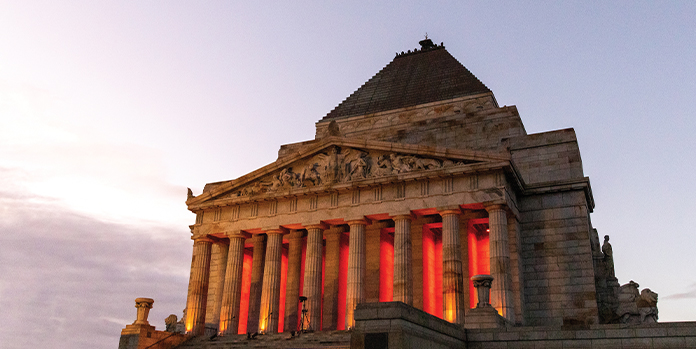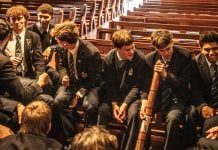At 5am on 25 April 2025, 80 Melbourne Grammar School students drawn from Years 9 – 12, 15 Senior School staff, and numerous parents gathered at Ross Gates before walking together to the ANZAC Day Dawn Service at the Shrine of Remembrance.
For the past fifteen years, this tradition has enabled the School community to honour Old Melburnians, former teachers, and family members who gave their lives in service to their country. This year, several students wore on their blazers the medals of their great-grandfathers and grandfathers, some of whom were Old Melburnians.
Here, Year 11 student Oscar Froomes reflects on what attending the Service means to him.
During the service we stood in solemn silence beneath the dim glow of the rising sun, wondering at the ANZACs’ unyielding resolve to defend something greater than themselves. Young men, not much older than me, giving up their youth, love, comfort and safety so that future generations might live with greater freedom and prosperity.
As the mournful cry of the Last Post drifts into the morning sky, we, the assembled, are united in reverence. In that moment, we are bound not only by shared silence but by a deep respect for the sacrifices made, and a quiet compassion for the families who bore the cost.
The ANZAC story is not just one of endurance in battle, but of dignity in suffering. We remember the cigarettes exchanged in No Man’s Land, the hands extended to retrieve a fallen friend, and the ceasefires honoured so the dead might lie in peace.
These were not just acts of mercy, but of intense humanity; reminders that even in the most brutal circumstances, compassion can endure. And so, each year, as the light breaks over the Shrine and the stories are retold, we do not simply remember, we carry forward their legacy, are shaped by their values, and are inspired to live by them.
The ANZAC legacy
My reflection on the ANZAC legacy revealed something far deeper than mere historical reverence. I gained an insight into the moral fabric of human character when tested by extremity. The young men who fought at Gallipoli were not heroic because they were fearless, but because they chose to act in spite of fear, driven by loyalty, duty, and a profound sense of service to something beyond themselves. Their actions speak to a universal philosophical truth: that true virtue lies not in comfort, but in the courageous pursuit of what is right when the challenge is supreme.
In remembering them, we are reminded that gratitude alone is not enough; we are called to serve, in our own way, with integrity and courage.
In our contemporary world, we are rarely called to battle in the literal sense, but we are confronted daily with subtler, internal battlegrounds, moments that ask us to choose between ease and principle, popularity and authenticity, silence and truth.
The ANZAC legacy, then, is not just a story of war, it is a call to live with moral clarity, to cultivate resilience in the face of failure, and to hold fast to integrity even when the path is difficult. To honour the ANZACs is to exalt their values and show true virtue.




